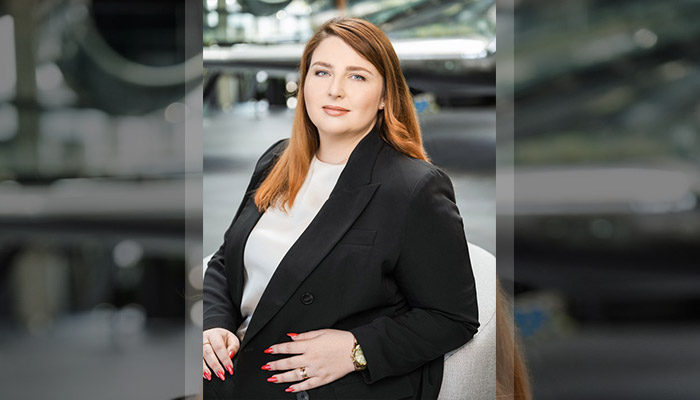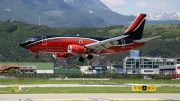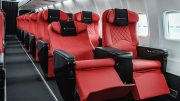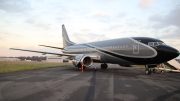The global aviation industry continues its post-pandemic rebound. According to the International Air Transport Association, total passenger traffic in 2023 rose by 36.9% compared to the previous year, steadily catching up with pre-pandemic levels.
Out of recovery mode and on a growth trajectory, aviation is now struggling to meet the rising demand for air travel. Talent shortage is at the root of the challenge. Aviation professionals who left the sector during the pandemic downturn are slow to come back, and the numbers of new specialists cannot quench the industry’s thirst for fresh talent. For instance, projections show that the global pilot shortage could reach 50,000 pilots by 2025.
For Sandra Diaso, Head of Human Resources at KlasJet, the key to bringing people into aviation – and keeping them there – is treating them as individuals. We sat down with Sandra to discuss the continuous demand for new talent, the role of high-tech in HR, and the importance of the human touch in aviation.
Tell us a little bit about your general experience in the aviation industry.
The first thing I’d say is that, in aviation, you can never claim to be an expert. It’s a continuous process of learning from experience. With that said, I have been working in the industry for almost a decade now, so I do have quite a bit of accumulated knowledge. Especially since I’ve had the opportunity to observe the industry from different angles.
I started out as a Training Manager, and was responsible for organising trainings for pilots and cabin crew. After a year of doing that, I was invited to join the company’s HR department, where my job was handling recruitment and payroll.
For the past three years, I’ve been the Head of HR, which massively expanded the scope of my work, as I’m now responsible for both the administration and the flying personnel of the entire organisation, globally. As I like to say, “24 hours in a day is not enough”.
What industry-related challenges have you been facing in your daily work?
Aviation is a truly global business, meaning it’s sensitive to any turbulence coming from economic development, changes in oil prices, geopolitical shifts, war, border closures – and tons of other events that send waves across the world.
The primary concern for aviation today is, however, safety. During COVID, the common prediction was that it would take us 2-3 years to rebound when it was over. As it turned out, it took several months. For this reason, demand for aircraft, flying personnel, cabin crews, and pilots is still very high. This, in turn, means that standards have dropped off slightly as airlines are forced to prioritise quantity over quality. So, the question of how to maintain, and increase, safety is definitely a top priority.
Regarding opportunities – in the 21st century, there’s no shortage of those! With modern IT and AI technologies, we can optimise our daily activities – and this includes HR – to an unprecedented degree. This enables us to work faster, be more productive, and further up our game in terms of quality.
Speaking of AI, do you see any potential applications of it to aviation that we could look forward to?
In aviation as a whole, extensive adoption of AI solutions may not happen very soon, because our industry is very strictly regulated. Specifically in HR, on the other hand, we’re already using an AI-powered recruitment system and it’s a really big help. For instance, once an applicant uploads his resume, the system uses the information it contains to automatically create a user account for that applicant. This reduces the need for that manual work. It can also predict, with some accuracy, the applicant’s key skills, qualifications, and other characteristics.
What is your strategy for attracting top talent?
The labour market has already changed quite a bit, in part because of generational turnover. In response to what young people care about the most, we’ve de-emphasised salary, and are now focusing more on employer branding, work-life balance, commitment to innovation, and rapid career advancement. Let me expand a little bit on that. So, as far as the employer branding is concerned, we are concentrating on communicating how we are a dynamic and elite option, but also supportive and nurturing. A good work life balance is something that is expected so it’s important for us to emphasise that burnout and overwork do not need to go hand in hand with a career in aviation. Then there’s the fact that young people want fast career paths, they are, after all, eager, and can be quite impatient. That’s why some of our programs like our Cadet Academy are so vital, as they allow us to give qualified and ambitious talents the help they need to climb the professional ladder. That’s why we have the slogan,”learn with Klasjet.” But more than anything else, the biggest thing for us is building that personal bond and making sure that we keep it going. You need to make sure that you actually take the time to meet people in person and keep that personal connection going throughout their training and into their working life. That’s why face to face is so important for us. We also are working to find the talent young and give them the help they need, both in terms of financial support via the funding and mentoring that they need to get into the industry.
Are you able to address the shortage of qualified pilots in any way?
Since this is undoubtedly going to remain a problem for years to come, we’re already taking some proactive steps to address the shortage through direct intervention. Specifically, we’re launching a cadet academy, which is very similar to traditional flight academies, but exclusively available to our employees. This initiative not only helps us cultivate our own qualified pilots but also strengthens our workforce by investing directly in those who already contribute to our operations. Graduates of our cadet academy will receive Type-R certification, enabling them to operate within our Boeing fleet. Additionally, they will have the opportunity to join our company as pilots, where they can accumulate flying hours and become invaluable assets to our team. By fostering growth and loyalty among our people, we’re building a stronger future for our airline.
How do you foster a positive working environment and promote employee engagement?
As we continue to expand – just last year the company grew by 221%! – we’re trying to keep our human touch, rather than become a massive, impersonal organisation that people feel increasingly alienated by. For instance, I know everyone’s names, I know their stories, we chat, I inquire about their families. And it really works!
We’re also trying to meet the high demand for training and fast career advancement opportunities, and to engage with employees directly through face-to-face conversations and a variety of initiatives. To this end, we hold weekly or monthly meetings, and every quarter I personally go to visit different bases. I talk to people there, ask them about how they’re doing. With this alone, I’ve found, half the problems resolve themselves automatically. We also have an insider’s newsletter, where everyone – from office workers to pilots and flying personnel – is free to share their achievements, progress, interesting stories, what have you. This is also a good way to reduce the gap between employees who don’t normally come into contact.
What are you doing to ensure equal opportunities at work and minimise discrimination?
Our goal is to create a fair and respectful environment for all. Performance is what matters, in the end, so we’re focusing on people’s skills and abilities, not their age, gender, race, or anything else. To make it really clear to our employees that we genuinely care about this, we also hold special annual training sessions.
Having recently achieved such extraordinary growth, we now have employees from all five continents – which is great, because one of our key values as a company is unity! We highly value the insights, suggestions, and ideas that people of different backgrounds and cultures bring to the table.
Do you have a sense of what the future holds for HR specialists in your industry?
One crucial thing is that, if you want to be at least one or two steps ahead of the competition, you must be proactive. More specifically, you must stay up to date on whatever’s going on around you – in other airlines, aviation-related companies and brands, the list goes on. This is necessary to have a clear picture of where you stand in relation to other airlines, and to be able to plan and make informed decisions.
Another thing we’re likely to see more of in the future is fostering employee development in-house. For instance, there aren’t very many HR specialists experienced in aviation, which makes it important to pass down your knowledge to those around you. This creates new opportunities for others – and, why not, makes your own job that much easier.
What sets KlasJet apart in this very competitive environment?
I think that our low turnover of staff is the best illustration of what I hope we are doing right. As I said before, the real key is to focus on the individuals. First, of course, successful candidates need to have the talent and potential to go the distance. We are very exacting here when it comes to selecting talent. But it’s important to note that anyone is welcome here at KlasJet, as long as they measure up to our standards for performance. This is also something that we apply to ourselves as well. Then once you join us, we will do everything we can to support and develop you. And here, as I mentioned earlier, we really privilege building long lasting one to one relationships. We want to be a recognisable face, not just an email address. Through thick and thin, we are there to offer fully informed advice, the best training, and a supportive ear. That is why I think we can say that we stand out in the market.









Be the first to comment on "KlasJet’s Head of HR on attracting top aviation specialists amidst talent shortage"